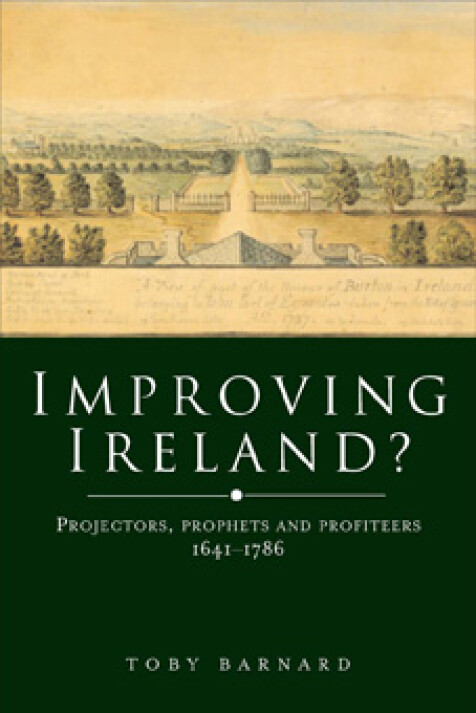Improving Ireland?
Projectors, prophets and profiteers, 1641–1786
Toby Barnard
'Toby Barnard reconstructs the story of improvement in Ireland in seven independent but interlinked essays, each a gem in itself. The book is necessarily episodic because it draws upon the experiences and writings of a carefully chosen few, notably William Petty; Richard Lawrence; John Perceval, second earl of Egmont; and Robert Ffrench of Monivea … [W]e do learn a great deal, from different perspectives, concerning the various and varying agendas of Ireland's improvers, and the essays provide witness that Toby Barnard is the most accomplished essayist writing on Irish history today’, Nicholas Canny, Irish Times.
‘The impressive range and depth of the archival research which underpins this study and the elegance of the prose will come as no surprise to those familiar with Barnard’s earlier work. Improving Ireland brings together in one publication the fruits of many years’ work. Its portrayal of improvers is balanced and astute and the study offers many perceptive insights into important aspects of Irish society in the seventeenth and eighteenth centuries', Paddy McNally, EHR (August 2011).
‘… the author is an excellent essayist. As he weaves his way through the lives and concerns of the mainly Protestant landowners of the period and the intellectual, practical religious aspects of their plans to ‘improve’ the backward, wild, debased Irish landscape and society he tells a deeply engaging story. From the design of the original demesnes with their landscaped gardens, which was particularly fascinating, the foundation of the model estate villages, the establishment of schools, the development of fishing and the role of the Bible, Toby Barnard lays bare certain elements of Irish life. The chapters are well written without being dry, and though they are often obscure that is only because obscurity is the word I use in place of a reviewer’s ignorance … Toby Barnard is a fine writer and this really is a fascinating collection of essays’, Joe Horgan, Books Ireland (December 2008).
‘[A]n entertaining and informative book’, Books Ireland (September 2008).
‘A specialist in Ireland the 17th and 18th centuries, Barnard looks at selected episodes of cults and cultures of improvement there during the period, some collective and some individual. The examples display the diversity, the setbacks, the oddities, and the undoubted achievements of the zealous improvers ... ’, Book News (November 2008).
‘The Petty chapter is the most engaging in the volume, benefiting from access to the Petty archive deposited in the British Library in 1993. Under the veneer of “improvement,” a reader is struck by how confiscation, opportunistic marriages, unscrupulous legal chicanery, and ruthless insider trading really explain the success of self-made men like Petty and his predecessor Robert Boyle. They profited more from rebellion and confiscation than from all the “P” words that Barnard likes to deploy – property, Protestantism, power, progress, peace, plenty, placidity, prosperity … A second sparkling essay with a real sting in its tail concerns the Galway improver French. His Catholic father Patrick French conformed to Protestantism in 1709 and facilitated his professional and social advancement to an estate of 6,000 acres. Robert enjoyed a glowing reputation as a much-lauded paragon of public virtue’, Kevin Whelan, American Historical Review (April 2009).
'Toby Barnard’s printed work over the last thirty-five years has been very influential on the historiography of seventeenth and eighteenth-century Ireland. Few fields of historical research have been left untilled; even fewer archives', Eoin Magennis, Irish Historical Studies (May 2009).
‘Much work remains to be done on the precise role played by the Dublin parliament in fostering improvement in the long eighteenth century, and the subject still lacks a solid body of case studies … Improving Ireland? provides an important contribution to this endeavour, presenting a number of studies of individual improvers. The individuals focused on range from the well known, Sir William Petty, to the more obscure, Robert French of Monivea. Studies of more collective endeavours are also provided, such as the improving efforts of successive Earls of Egmont, the Percecvals of County Cork … [the book] provides a fascinating peek into, if not a full exploration of, the shadowy, and admittedly small, realm of eighteenth-century Catholic improvers … an important contribution to the historiography and one which any student or researcher of the subject would greatly benefit from reading. It could only have been written by someone intimately acquainted with multifarious aspects of the social, political and economic history of early modern Ireland', Andrew Sneddon, Eighteenth-Century Ireland (2009).
‘Toby Barnard presents a series of essays tackling both the underlying philosophies of improvement and its consequences … [his] book is a useful collection of the hopes and disappointments of the improvers', W. Forsythe, Irish Geography (March 2010).

